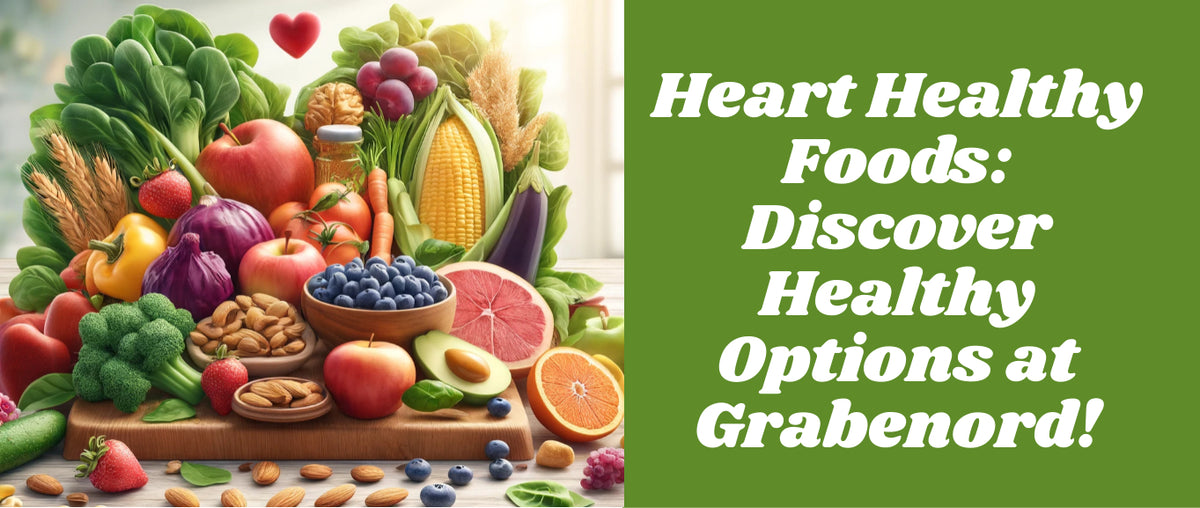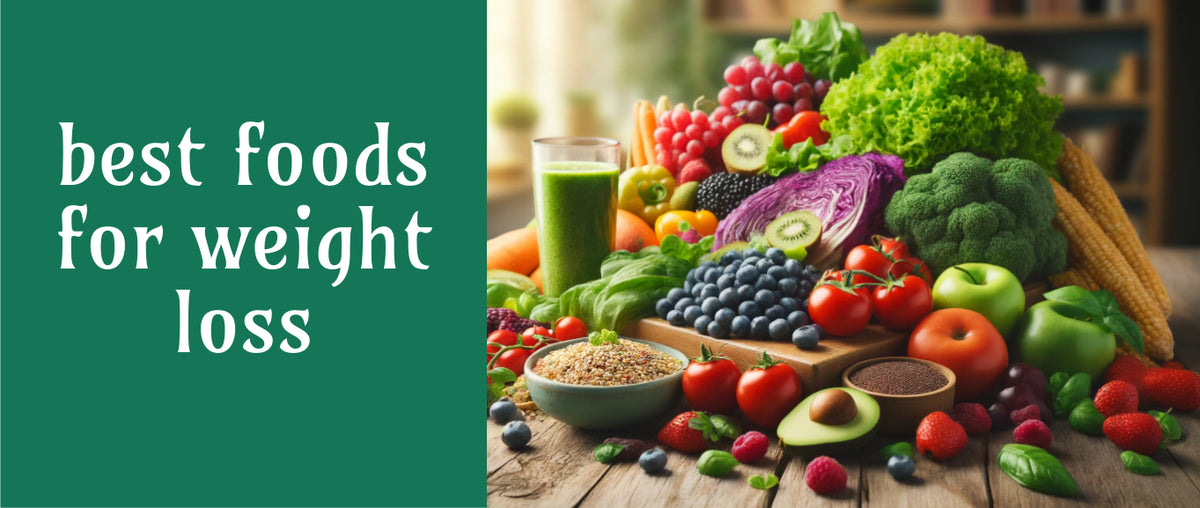Heart Healthy Foods
A heart-healthy diet is a way of eating that helps reduce the risk of heart disease. It emphasizes fruits, vegetables, whole grains, and lean protein sources while limiting saturated fats, sodium, and added sugars. This can be achieved through practical changes like starting with whole grains for breakfast, incorporating more vegetables into meals, and choosing healthy snacks.
Heart disease remains one of the leading causes of mortality worldwide, but much of its risk can be mitigated with lifestyle changes, particularly through diet. Healthy eating isn't just about choosing the right foods but also about consuming them in a way that benefits overall heart health. This article explores various heart-healthy foods that can help manage weight, improve muscle recovery, and even provide healthy snacks for kids.
Key Takeaways
- Best Foods for Weight Loss: Including specific heart-healthy options that help manage and reduce body weight effectively.
- Muscle Recovery: How certain heart-healthy foods can aid in muscle repair and recovery after exercise.
- Healthy Snacks for Kids: Offering tasty and nutritious snacks that are good for both heart and overall health.
Understanding Heart Health
Heart health refers to the efficient functioning of the heart and circulatory system. Keeping the heart healthy involves managing diet, exercise, and lifestyle choices to prevent conditions such as hypertension, heart attacks, and stroke. A healthy diet rich in fruits, vegetables, whole grains, and lean proteins is fundamental to heart health.
What Does Heart Health Mean?
Heart health is pivotal for overall well-being. It involves maintaining optimal blood pressure, cholesterol levels, and heart functionality. A heart healthy diet not only supports the heart but also enhances the overall quality of life by improving energy levels, muscle recovery, and mental health.
The Relationship Between Diet and Heart Disease
The food you eat can directly affect the health of your heart. Foods high in saturated fats, sodium, and sugars can increase the risk of heart disease, while a diet rich in fruits, vegetables, and whole grains can lower this risk. Introducing Kombucha , a fermented tea known for its heart benefits, and Healthy Drinks like green tea can further enhance heart health.
The Best Heart-Healthy Foods
Leafy Green Vegetables
Leafy greens like spinach, kale, and collards are powerhouse foods packed with vitamins, minerals, and fibers but low in calories. These vegetables are a fantastic source of vitamin K, which helps protect arteries and promote proper blood clotting. They also have high levels of dietary nitrates, which have been shown to reduce blood pressure, decrease arterial stiffness, and improve the function of cells lining the blood vessels.
Whole Grains
Consuming whole grains like oats, barley, and quinoa is another key to maintaining heart health. Whole grains are significantly beneficial for coronary heart disease prevention due to their high content of fiber, which helps lower bad cholesterol (LDL) and overall cholesterol levels. They're also considered some of the best foods for weight loss because they help promote satiety and control appetite.
Berries
Strawberries, blueberries, blackberries, and raspberries are jam-packed with important nutrients that play a central role in heart health. Berries are rich in antioxidants like anthocyanins, which protect against the oxidative stress and inflammation that contribute to the development of heart disease. Adding berries to your diet is an easy way to enjoy a healthy snack for kids and adults alike.
Avocados
Avocados are an excellent source of monounsaturated fats, which are widely noted to reduce levels of cholesterol and lower the risk of heart disease. They also provide a substantial amount of potassium, a mineral that's crucial for heart function. This makes avocados a great addition to a healthy diet, enhancing the flavor and nutritional profile of many dishes.
Fatty Fish and Fish Oil
Salmon, mackerel, sardines, and other fatty fish are rich in omega-3 fatty acids, which have been found to decrease triglycerides, lower blood pressure slightly, reduce blood clotting, and decrease the risk of strokes and heart failure. Including fish oil as part of your dietary supplements can also support heart health, especially for those who do not consume fish regularly.
Nuts and Seeds
Walnuts, almonds, and flaxseeds contain fiber, omega-3 fatty acids, and vitamin E, which all contribute to heart health. Walnuts, in particular, have high amounts of alpha-linolenic acid (ALA), an omega-3 fatty acid that's linked to heart benefits. Cashew Butter, made from these nuts, offers a tasty and nutritious alternative to traditional spreads that are high in saturated fats.
Legumes
Beans
Beans, including varieties like black beans and kidney beans, are high in fibers, protein, and antioxidants that help combat heart disease by reducing inflammation and improving overall heart function. Black beans stand out for their high protein content with minimal fat, making them an ideal component for a Plant Based Protein.
Oils and Fats
Olive oil is a fundamental component of the Mediterranean diet, renowned for its heart-health benefits. It's high in monounsaturated fats and antioxidants, which help lower bad cholesterol levels and reduce the risk of heart disease. Similarly, vegan butter can be a healthier alternative to regular butter, particularly if it's unsalted and made from heart-friendly oils.
Soy Products
Tofu, made from soybeans, is a great source of protein and contains all essential amino acids your body needs. It's also rich in polyunsaturated fats, fibers, vitamins, and minerals, making it a heart-healthy food that's excellent for those following a vegan lifestyle. It's a versatile ingredient that can be used in a variety of dishes, promoting a Vegan Shop's range of products.
Root Vegetables
Sweet potatoes are rich in fiber, potassium, and antioxidants. These nutrients help lower blood pressure and protect against heart disease. They are also a great choice for those looking to maintain a healthy weight.
Also Read
Dietary Tips for Heart Health
Limit Sodium
To help reduce blood pressure, it's crucial to limit the intake of sodium. Common strategies include choosing fresh vegetables over canned ones and avoiding processed foods. More tips can be found under Tips to Reduce Salt and Sodium.
Limit Saturated Fats
Saturated fats found in some meats, full-fat dairy products, and tropical oils can raise your bad cholesterol and worsen heart conditions. Opting for plant based butter instead of regular butter can add flavor without the health risks associated with high saturated fat intake.
Limit Added Sugars
Consuming too much sugar can lead to weight gain and increase heart disease risk. Limiting foods and drinks with added sugars is a key part of maintaining a heart healthy diet.
Limit Alcohol
While moderate alcohol consumption might be heart-protective for some, excessive drinking can lead to a myriad of health issues, including elevated blood pressure and harmful levels of certain fats in the blood.
heart healthy diet Tips
Incorporating heart-healthy foods into your daily meals doesn't have to be challenging. Here are practical ways to enjoy these nutritious options:
- Start the day with whole grains: Opt for oatmeal or whole-grain cereals topped with berries and a splash of almond or cashew butter.
- Pack on the vegetables: Make half your plate vegetables, especially leafy greens and other colorful vegetables, to boost heart health with minimal calories.
- Choose healthy proteins: Favor plant-based sources like beans and tofu, or lean animal sources such as fatty fish or skinless poultry.
- Snack smart: Choose nuts, seeds, and fruits instead of processed snack foods. A handful of walnuts or homemade trail mix can be excellent healthy snacks for kids and adults.
- Use healthy oils: Cook with olive oil instead of butter or margarine. For added flavor without added health risks, try drizzling garlic butter over cooked vegetables or fish.
Recipes and Meal Ideas:
- Berry and Avocado Smoothie: Blend blueberries, strawberries, a ripe avocado, and a bit of kombucha for a refreshing and heart-healthy drink.
- Grilled Salmon with Walnut Pesto: Serve this omega-3-rich fish with a side of quinoa salad dotted with diced sweet potatoes and black beans.
- Vegan Cheese and Spinach Stuffed Peppers: A delicious and satisfying plant-based dish that utilizes vegan cheese and heart-healthy olive oil.
Scientific Backing and Research
Numerous studies support the benefits of the foods listed above for heart health:
- Leafy greens and berries have been shown in studies to reduce the risk of heart disease by improving arterial function and reducing blood pressure.
- Whole grains have been linked with lower rates of heart disease, largely due to their ability to lower cholesterol and stabilize blood sugar levels.
- Omega-3 fatty acids, found abundantly in fatty fish and flaxseeds, are known to reduce inflammation and improve heart rhythm, reducing the risk of heart failure.
- Research has demonstrated that replacing saturated fats with healthier fats, as found in nuts, seeds, and vegan butter, can significantly reduce heart disease risk.
Challenges and Considerations
Adopting a heart healthy diet can come with challenges and considerations:
- Misconceptions: Many people believe that a heart healthy diet requires completely avoiding all fats or indulging in expensive or hard-to-find foods. In reality, it's about making smarter food choices and balancing nutrients effectively.
- Dietary Restrictions and Allergies: Those with specific dietary needs or allergies can find adapting to a heart healthy diet challenging. For instance, individuals allergic to nuts can opt for seeds or hypoallergenic Vegan products as alternatives.
- Cultural and Personal Preferences: Adapting heart-healthy guidelines to fit into various cultural cuisines and personal preferences can help make these changes more sustainable and enjoyable.
Conclusion
Embracing a heart healthy diet involves more than just eating the right foods; it's about making sustainable changes to improve your overall health and quality of life. By incorporating these foods into your daily diet, you can significantly reduce your risk of heart disease and boost your general well-being. Remember, gradual changes can lead to lasting impacts, and every small step counts towards a healthier heart.
If you are a vegan, looking to dine something vegan in your city, check out our list of vegan restaurants in India.










